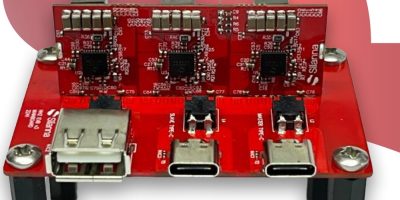High-density evaluation board is for 65W multi-port fast chargers
To simplify the design, testing and prototyping of 65W multi-port USB-PD and QC fast charging applications, Silanna Semiconductor has introduced the SZPL3002AA-EVB03 evaluation board.
It is designed to deliver a real-life implementation when used with a front-end AC/DC converter and integrates three Silanna SZPL3002A DC/DC converter ICs. These are the world’s first integrated buck converters to offer intelligent power sharing capabilities, said Silanna. The board also includes two USB-C female connectors and one USB-A connector and screw terminals at the input for connection to a DC supply (typically 24V).
The board is pre-configured with contract configurations for two 65W Type-C PD ports and an 18W QC Type-A port. Total power is limited to 65W and is constantly monitored and re-allocated between ports by the firmware.
The switching frequency is set to 667kHz with 8ms of soft start time. An I2C bus interface allows for inter-IC communication among the SZPL3002A devices for advanced applications in shared power, multiple output charging ports. The bus also facilitates programming on-board OTP (one time programmable) memories.
The board will “dramatically simplify the evaluation of advanced multi-port USB-PD and QC designs featuring intelligent power sharing between ports,” to optimise charging across a variety of use cases.
The board also includes a built-in USB PD/FC port controller and operates with efficiencies to 98 per cent. The Silanna SZPL3002 DC/DC converter is supplied in a QFN 5.0 x 5.0mm thermally enhanced package and reduces the number of components needed to implement 65W fast charger and adapter applications, confirmed the company.
Typical use cases include AC/DC chargers, multiple output USB-PD charging strips and USB-PD outputs in displays, televisions, docking stations and laptops. The integrated port controller offers full support for USB PD V3.0 Type C interfaces and QC2.0/3.0/4.0/5.0 support for Type A/C connections. The controller facilitates power sharing and port power re-balancing functionality across two or three ports to adapt port power to the needs of a particular device, irrespective of when connections are made.




